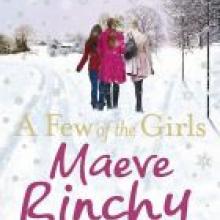
Tongue in cheek aside, A Few of the Girls offers up 41 stories, some of which have been published before, but most of which have not.
It says something of Binchy's prolific output that so many works were still available to her publishers that hadn't already seen the light of day.
As with the previous collections of hers that I've read, the quality was consistently high and it was an easy tome to devour.
Binchy has a friendly, conversational style that lends itself to apparently relaxed storytelling.
I say apparently because of course it's far from easy to achieve that and therein lies the skill.
It's as if she's talking to you but with such fluency and economy that no words are wasted.
Her choice of subject matter varies widely but there is a common theme - human frailty (and sometimes cruelty) in many guises, be it women deluding themselves about men, people deceiving or manipulating others, vanity, mistrust, greed, social climbing, obsession, hiccups in families and friendships, office politics - to list just a few examples.
Her range and imagination are impressive.
She can take the simplest idea (a woman planning Christmas for the family, a niece's relationship with her aunt, a holiday marred by a lost suitcase) and transform it into an engaging tale with an unexpected ending.
Although Binchy has a sharp eye for failings, there is plenty of wry humour to be had and characters who balance out the equation with kindness and common sense.
And if ever there was a woman who exuded common sense, it was Maeve Binchy, whose down-to-earth columns in the Irish Times endeared her to readers and cemented her popularity in Ireland.
She was known for possessing both practicality and depth of understanding, which is probably why she was so good at lampooning those who lacked either of those qualities.
A Few of the Girls benefits from Binchy's humorous understatement about fools and foolish behaviour, saying far more about them than heavy-handed criticism could ever do.
A pleasure to read.
• Caroline Hunter is an ODT subeditor.











